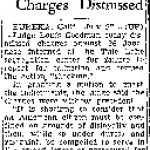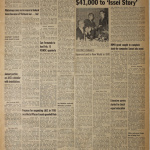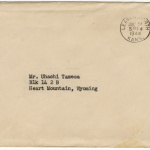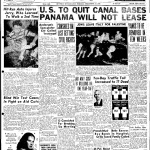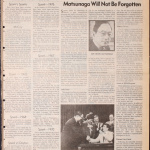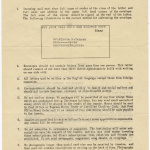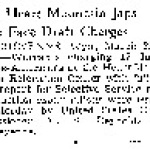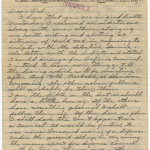No-No Boy (book)
| Title | No-No Boy |
|---|---|
| Author | John Okada |
| Original Publisher | Charles E. Tuttle |
| Original Publication Date | 1957 |
| Current Publisher | University of Washington Press |
| Current Publication Date | 2014 |
| Pages | 308 |
| WorldCat Link | https://www.worldcat.org/title/no-no-boy/oclc/881386427 |
In 1956, Nisei writer John Okada wrote No-No Boy , a novel that explored the predicament of a Japanese American World War II conscientious objector, having served time in prison for refusing to serve in the military, who returns home only to face the consequences of his decision. Upon arriving in his former neighborhood, he is met with hostility and despair. He discovers that his mother delusionally believes that Japan has won the war, and his younger brother—ashamed of Ichiro's decision to refuse the draft—abruptly quits high school to join the army himself. In the course of the novel, Ichiro's inner conflict grows to reflect the racial tension and residual anguish following the war and his individual guilt represents the conflict of the country at large.
While the title of the novel refers to men and women who either refused to complete or answered 'no' to questions 27 and 28 on the War Relocation Authority's Leave Clearance Application Form, it is also acknowledged as a misnomer since the book's protagonist is sent to federal prison for resisting the draft, not for answering the loyalty questionnaire negatively.
According to the book's original publisher, No-No Boy was rejected by the Japanese American community upon publication and received little commercial attention. [1] The novel was largely forgotten until the 1970s, when it was rediscovered by Lawson Fusao Inada and Frank Chin, young Asian American writers in search of a literary heritage to call their own. No-No Boy is considered to be one of the first Japanese American novels to delve into the stories and the impact of those who resisted the draft, thereby questioning their identity based on racial politics and the meaning of American citizenship In 1979, the University of Washington Press brought No-No Boy back into print, where it has established itself as one of the most important pieces in Asian American literary history.
John Okada was born in Seattle, Washington, in 1923. In 1942, the Okada family was forced into the Puyallup detention center outside Seattle and then sent to the permanent camp in Minidoka , Idaho. Okada was among the first Nisei to obtain clearance to leave camp and enroll in college at Scottsbluff Junior College in Nebraska, which was outside the military zone restricting Japanese Americans. Unlike the protagonist of his novel, Okada served in the U.S. Army in World War II. After finishing the school year he enlisted in the army and was trained as a Japanese language translator by the Military Intelligence Service Language School at Camp Savage in Minnesota, eventually earning the rank of sergeant as a translator and interpreter. Following his service, Okada returned to Seattle to earn his bachelor's degree in English from the University of Washington, where he wrote and staged at least one student play at a campus playhouse. He earned his master's degree in English from Teachers College at Columbia University in New York City, where he met Dorothy Arakawa. They married on June 24, 1950, in Seattle, where their two children were born. Okada pursued a second B.A. from the University of Washington in library science and supported his family working as a public librarian, first in Seattle, and later in the Midwest. He switched careers in the mid '50s, working as a technical writer and completing the manuscript for No-No Boy in Detroit. The novel was published in Japan in 1956 by Charles E. Tuttle Company. According to John's widow, after his death, she offered all of his manuscripts, notes and correspondence to a university archive, but was refused. Believing no one had any use for them, in a fit of grief, she burned everything. [2]
No-No Boy was adapted as a stage play of the same title by Ken Narasaki in 2009. The play had its world premiere on March 26, 2010, at the Miles Memorial Playhouse in Santa Monica, California.
In 1979, Okada was chosen as the namesake of the Asian American ethnic themed dorm at Stanford University, in honor of John Okada's legacy. [3]
In 2014, the University of Washington Press released a new edition of No-No Boy featuring a foreword by novelist Ruth Ozeki and original cover art by Jillian Tamaki. This edition also includes an introduction by poet Lawson Fusao Inada.
Find in the Digital Library of Japanese American Incarceration
This item has been made freely available in the Digital Library of Japanese American Incarceration , a collaborative project with Internet Archive .
Might also like: Famous Suicides of the Japanese Empire by David Mura; Tule Lake by Edward Miyakawa; Starting from Loomis and Other Stories by Hiroshi Kashiwagi
For More Information
Akutsu, Jim. Interviewed by Art Hansen. Seattle: Densho Digital Repository, Jun. 9 and 12, 1997. http://ddr.densho.org/interviews/ddr-densho-1000-2-1/ .
Castelnuovo, Shirley. Soldiers of Conscience: Japanese American Military Resisters in World War II . Lincoln, NE: Bison Books, 2010.
Conscience and the Constitution . DVD. Produced by Frank Abe. Hohokus, NJ: Transit Media, 2000, 2011. " Conscience and the Constitution Teacher Guide". https://resisters.com/conscience-and-the-constitution/about-the-film/
Kashiwagi, Hiroshi. Swimming in the American: A Memoir and Selected Writings . San Mateo, CA: Asian American Curriculum Project, 2005.
Lee, Shelley Sang Hee. Claiming the Oriental Gateway: Prewar Seattle and Japanese American . Philadelphia: Temple University Press, 2011.
Lyon, Cherstin M. Prisons and Patriots: Japanese American Wartime Citizenship, Civil Disobedience, and Historical Memory . Philadelphia: Temple University Press, 2011.
Muller, Eric. Free to Die for Their Country: The Story of the Japanese American Draft Resisters in World War II . Chicago: University of Chicago Press, 2001.
Okada, John. No-No Boy . Seattle: University of Washington Press, 1979. UW website accessed August 4, 2014. http://www.washington.edu/uwpress/search/books/OKANO2.html
Omori, Emiko. Rabbit in the Moon . DVD. Public Broadcasting System. Last modified Feb. 11, 2011. https://www.pbs.org/pov/films/rabbitinthemoon/
Footnotes
- ↑ In Search of No-No Boy: Classroom Edition , DVD, produced by Frank Abe (Seattle: Resisters.com Productions, 2007).
- ↑ Frank Chin, "In Search of John Okada," Weekly of Metropolitan Seattle , 1976.
- ↑ "Wilbur Hall," Stanford University Residential Education. http://studentaffairs.stanford.edu/resed/directory/Wilbur .
Last updated Feb. 20, 2024, 5:47 a.m..

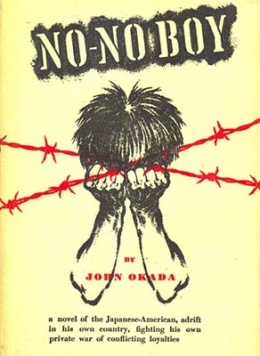 Media
Media
